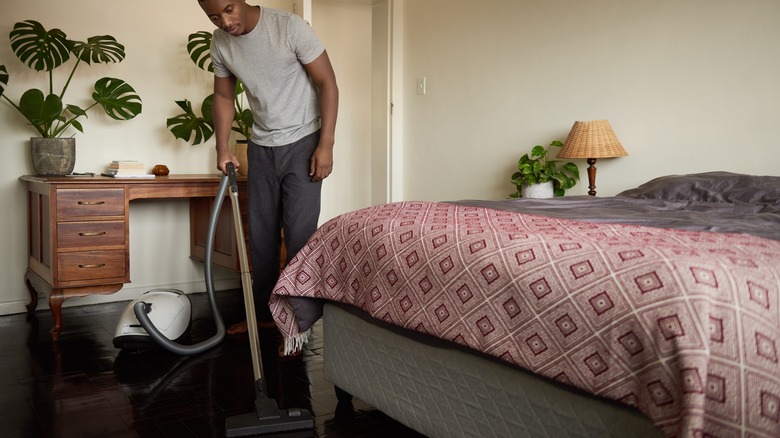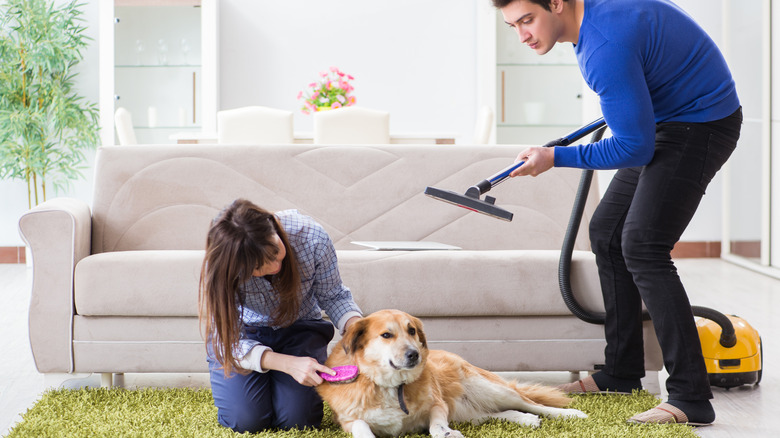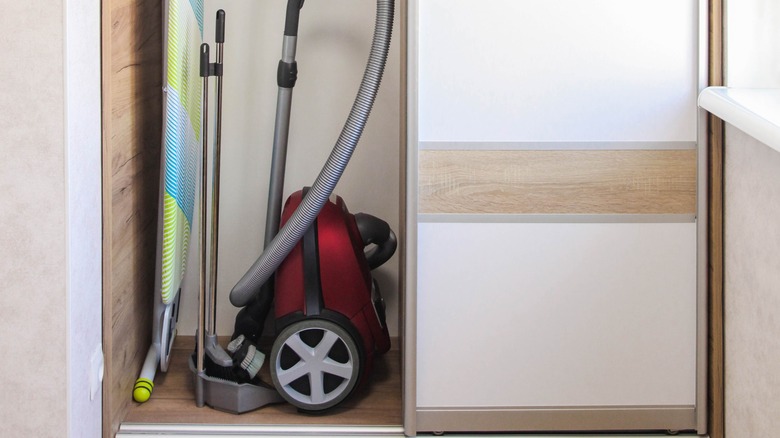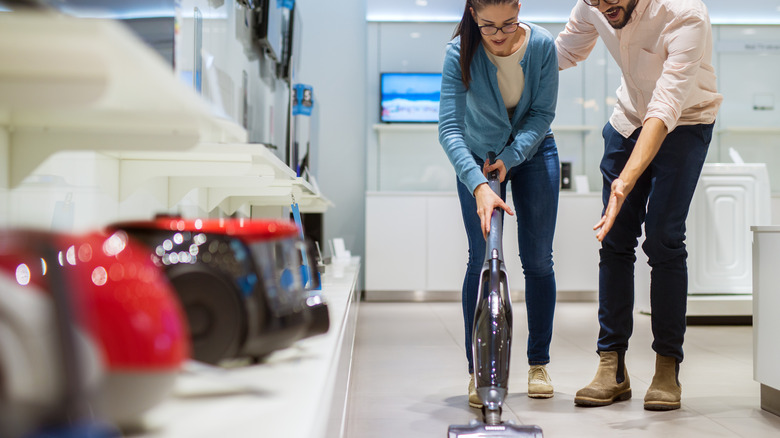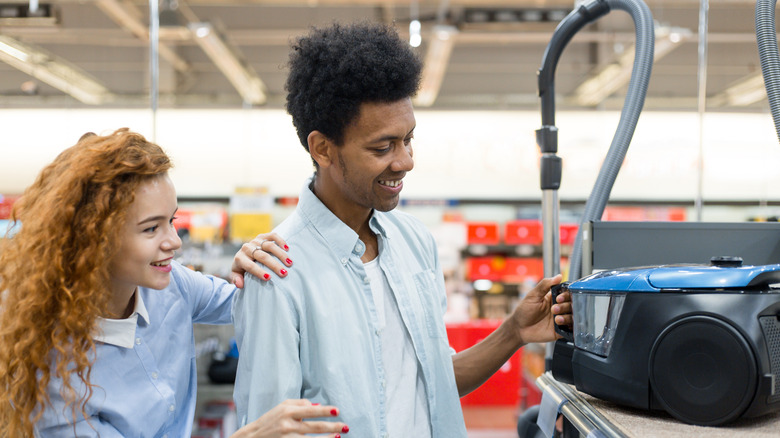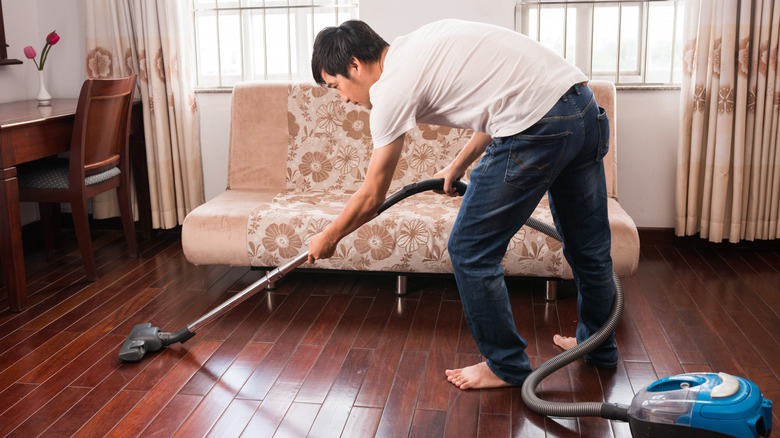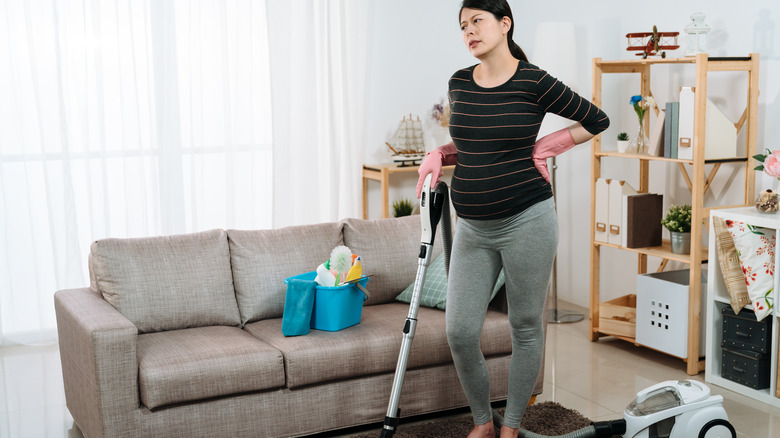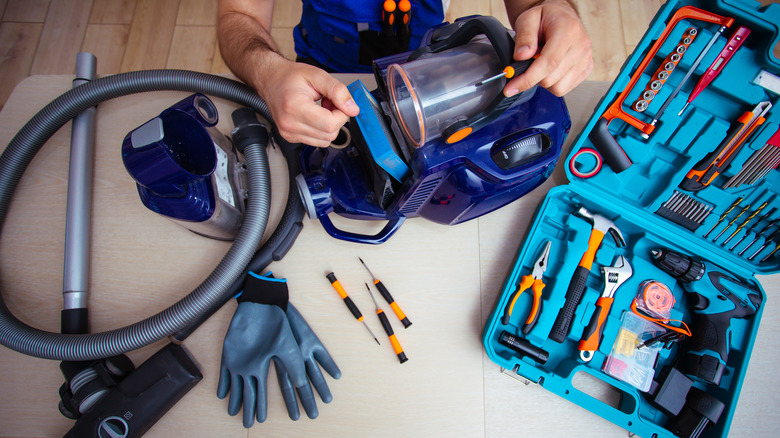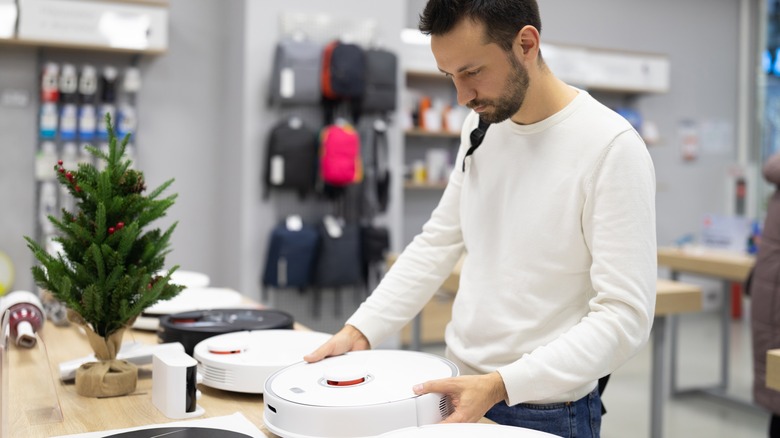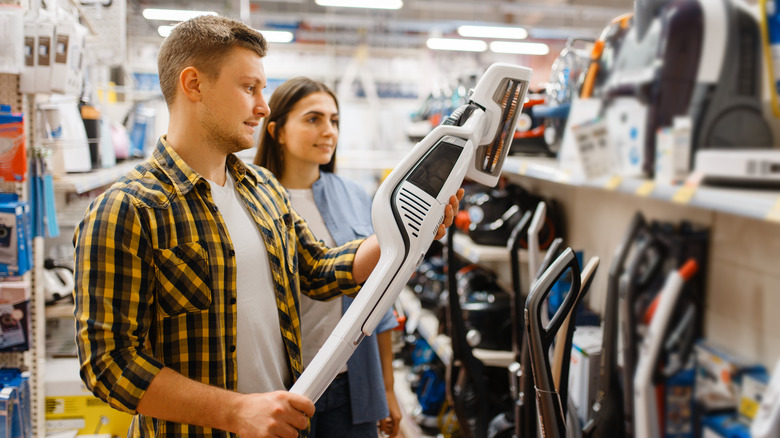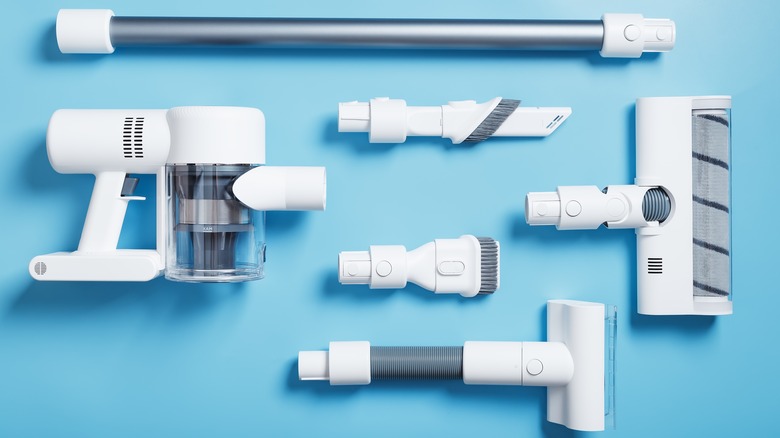Mistakes Everyone Makes When Buying Vacuum Cleaners
Vacuum cleaners are a staple in many, if not all, households. Look in any coat closet or laundry room and you will most likely find one. Vacuuming itself can be a hassle. You need to move furniture around and some vacuums are bulky and heavy. But vacuuming is an important process that, according to Everett Vacuum, improves your health, social interactions, and finances. Think about it. You wouldn't invite friends or family over if you haven't vacuumed in a while, right? And if you have any allergy suffers in the house, chances are you keep things tidy so they don't go into a sneezing fit.
That's why buying the right vacuum is key. It makes all the difference. But too often people buy the wrong one. They end up stuck with a machine that isn't doing what they need it to do. Before buying a vacuum, it's a good idea to sit down and do some research. Why? Because different vacuums do different things besides pick up dust and pollen. If you take some time to figure out what you need yours to do, you'll avoid the mistakes everyone makes when buying vacuum cleaners.
Take your pets into account
If you have a pet you're well aware of how much they shed. You love your pet unconditionally, but their hair gets everywhere and it seems impossible to keep up with. You could have just cleared the couch of clumps of hair only to find new ones have formed. Hair, pet or human, is a particularly hard thing to vacuum up properly. If you don't take your pets into account when buying a vacuum, you could end up buying one that burns out after a single use.
Hair collects quickly and can cause a blockage in the nozzle. The best vacuum for cleaning up pet hair is one that has strong suction power as well as a bag. HGTV says the best pet vacuum cleaners have a special rubber nozzle and rotating brush. These two keep the hair from getting stuck. Make sure the vacuum comes with plenty of attachments as you'll need narrower nozzles to reach those corners only your pet seems to be able to get to.
Allergy sufferers need high-efficiency cleaners
We all know an allergy sufferer or two. It might even be you. More and more people are beginning to experience allergies. While many start developing them as young as six, most people develop them later in life. According to the Asthma and Allergy Foundation of America, each year more than 50 million Americans deal with various types of allergies. Allergies are also the sixth leading cause of chronic illness in the country. That's why when you buy a vacuum cleaner, you want to make sure the allergy sufferer in your home is covered.
Your goal is to find a vacuum with a HEPA filter. This stands for high-efficiency particular air and The Spruce says these vacuums remove up to 99.97% of dust and particles that collect in your home. You'll also want to make sure the vacuum works on both carpet and hardwood floors. Dust doesn't just collect in carpets. And using a broom and dustpan only moves the dust around. A high-efficiency vacuum with strong suction will remove as many particles as possible.
Think about your storage options
Certain vacuum cleaners can be quite bulky, which makes storing them difficult. Others are made slim and light enough to hang on the wall. Before you go out and buy a vacuum, it's important to know where you plan on storing it. Do you have a large closet you can keep it in? Do you live in a small apartment with limited space? What about the attachments? Where will they go? Knowing how much room you have to store your vacuum will help you determine what size to buy.
Vacuum Reports claims there is no right way to store your vacuum, though you should consider a few things before purchasing. Your home's layout, the size of the vacuum, and how often you use it. If you opt to buy a large vacuum, you'll need to make space for it somewhere. Slimmer vacuums are easier to store, especially those that can be installed on the wall. But if the machine isn't powerful enough for what you need it for, you'll need to reconsider buying it. So before you bring a vacuum home, create a dedicated spot for it to live.
Buying a vacuum before testing it
When you are looking to buy a new car, what's one thing you do? You test drive it. You may test drive a few. Even if you're sticking with the same model, it's always a good idea to test drive a car before buying. You may not like the changes they made. It could feel different. Uncomfortable. Testing something before you buy it is common for many products. Including vacuum cleaners. You can and should test out a vacuum before you buy it.
According to a 2021 Consumer Reports feature, they have over 200 vacuum cleaner models in their database. That's a lot! And it's a lot to sort through. Remember, the model your mother-in-law swears by may not be the model you need. That's why it's important to test a vacuum before buying it. Don't be afraid to try it out in the store. You can ask a staff member to help you, especially if the vacuum is sitting on a high shelf. Most will accommodate your request. If they don't and you still want the model, ask what their return policy is. Once you get the vacuum home, try it immediately. If it's not to your liking, return it.
Not knowing what you want or need
We mentioned a moment ago that Consumer Reports has over 200 vacuum cleaner models in their database. That number is enough to make anyone's head spin. How are you supposed to choose the right vacuum when the number is that high? This is why it's important to sit down and figure out what you need and want out of a vacuum cleaner. It might seem strange to put so much attention and detail into a cleaning machine, but it's better to buy the right machine the first time around and save money.
When thinking about what you need and want consider the following: Do you prefer a cordless vacuum? A robotic one? What about a bag? Do you want one with lots of attachments? Are you comfortable moving a canister around? There's a lot to choose from. If you want to make sure you're buying the right one for your needs, take a day to write down a list of wants. This way when you go shopping you have it for reference and can narrow down your options.
Buying a vacuum that can do both hardwood floors and carpets
Many homes and apartments are a mix of both hardwood and carpeted floors. And not having a vacuum cleaner that does both will make cleaning a lot harder for you. Are there people who have two different vacuums — one for hardwood and another for carpet? Yes. But if you don't have that kind of space or budget, you'll want to focus on buying a vacuum cleaner that cleans both types of floors.
According to Wirecutter, most vacuums clean hardwood floors easily. It's the carpet side of things you need to pay attention to. This is because the thickness of your carpet matters. A vacuum can clean a hardwood floor with no problem, but a thick carpet could cause problems. When searching for vacuums that can do both, look for machines with strong suction. You might also want to consider ones that have different settings. For example, look for vacuums that have a switch that lowers or raises the brush depending on the type of floor you're cleaning.
Reading reviews
In this age of online shopping, it's hard to test something out before you buy it. Certain products should be bought physically if only to give you the option to test them out. Vacuum cleaners are one example. But it's not always possible for people to go out and shop in person. That's why, if you're looking to buy a vacuum cleaner online, read the reviews. Or refer to a source you trust. The Spruce has experts that test out all types of cleaning products, vacuums included.
Reading reviews is one of the most effective ways to ensure a vacuum is right for you. But don't only read positive reviews. Look at all of them, including the negative ones. Reading all available reviews will give you an overall feel of the vacuum and help you make a more reformed decision. Consumer Reports has a digital membership that gives you ratings and reviews of all the vacuums they have in their database. If you're shopping for a vacuum on a particular site, you can also email the company directly. Ask them about the vacuum's specs, and if need be, mention a review to help get your point across. Reviews help companies improve their products. That's why it's always a good idea to read and leave one yourself.
Picking a vacuum that strains your back
One of the biggest mistakes people make when buying vacuum cleaners is buying one that ends up hurting them. Vacuuming is hard enough without putting added strain on your body. Especially your back. This is why you want to buy a vacuum that doesn't force you to bend too much. This will make cleaning easier and save you from unnecessary pain. According to Good Housekeeping, choosing the right vacuum comes down to a few things, but the ease of maneuvering is at the top.
Consider your home and its setup of it. Would a canister vacuum be easy or difficult to move around? Would you have enough room to turn an upright vacuum, particularly a bulky one? Does the nozzle extend far enough so you don't have to bend too low to reach deep corners? This is where testing a vacuum before buying comes into play. Move it around the store's floor and see how your arms and back feel. Bend a bit like you're actually cleaning. You may look a little silly, but better to deal with a pretend vacuuming scene than using it for real and hurting yourself.
Weight consideration
Another reason you can severely hurt your back is not taking the vacuum's weight into consideration. This is a rather common mistake. People underestimate the weight of vacuums all the time. Certain vacuum cleaners can be super heavy. If you're not confident you can move it around comfortably, you should move on to the next option. Don't think that lightweight vacuums aren't as powerful. In a Rolling Stone article, they state that lightweight vacuums can be just as effective at keeping your floors clean.
It's all a matter of preference. If you vacuum on a regular basis, a lightweight vacuum is an ideal choice for you. You still want to buy one that can work on all types of floors and has strong suction, but if it doesn't hold that much it's okay. Weight restrictions on vacuums can help you narrow down your options. To repeat an earlier tip, make sure you test it out to ensure the weight works for you. Larger vacuums tend to be more durable and hold a lot more dust. If you prefer a machine that's going to last and be okay with getting a little banged up now and then, you're better off going for a heavier vacuum.
Checking for service options
There's nothing worse than when your vacuum stops working in the middle of your cleaning routine. According to Angi, there are many reasons why your vacuum cleaner might stop working. It could overheat, lose suction, or simply won't turn on at all. Some of these are easy to fix yourself, but when there's something worse you'll need to get it serviced or repaired. That's why when buying a vacuum cleaner, it's important to ask about service options. Does the store you're buying it in do repairs or would you have to go somewhere else? Is there a local vacuum cleaner repair service near your home?
If you don't have a plan about what to do if your vacuum stops working, it's best to figure that out before buying one. The last thing you want to do is buy a new vacuum only to find that the problem has fixed itself. Now you wasted money and you have two vacuum cleaners to store. Before buying, know your service options. If the store doesn't offer them, ask them where you can go. If they don't have a list, leave without buying, do a little research, then go back and pick it up when you do.
Shopping around before buying
Have you noticed a pattern yet? A common mistake people make when buying vacuum cleaners is not shopping around first. Vacuum cleaners are expensive and there are a lot of options to choose from. That can give you decision fatigue, but if you do a little research beforehand, you're going to buy the perfect one for you. Test as many vacuums as you need to. You're not in a race to buy one. You can also ask friends and family members about theirs. What do they like and don't like about them? Ask if you can test it out one day.
And don't ignore the possibility of buying a used vacuum. The writer of this Apartment Therapy piece bought herself a used vacuum and she loves it. There are more things to check and double-check when buying a used vacuum, but it's possible. While having more options might not sound appealing, they really do help you make better buying decisions. That's why it's important to give yourself time to shop around before buying a vacuum cleaner.
Learning about the specs before buying
It's hard to understand all the specifications vacuum cleaners have. Most models have different specs that set them apart from their competitors. Or so they claim. This one has the better suction, but that one is bagless. That's why it's a good idea to read up on what each spec is and whether or not it's something you need. A little research never hurt anyone. According to Best Vacuum, the specs you should be looking at are more than just suction and attachments. You should also pay attention to watts, horsepower, voltage, amps, water lift, and airflow.
Understanding each of these will help you choose the best vacuum for your needs. It's a lot to remember so write down the specs and their generic meanings. This way when you shop around you have a cheat sheet with you to help you make better decisions. Having a little extra guidance at your fingertips is a great way to make buying a vacuum cleaner less overwhelming.
Taking your budget into account
Admit it, buying a vacuum cleaner is not an easy task. You want to buy one and keep it for as long as possible so you don't have to go through all of this again. That makes sense. Vacuum cleaners are expensive. You don't want to be spending hundreds of dollars on one every few months. This is especially true for people with tighter budgets. While it's fine to spend a little extra money on something that's going to clean your house, you might still have to be cautious with how much you spend.
According to the Carpet Cleaner Expert, knowing your budget is one of the first things you should ask when deciding to buy a vacuum cleaner. You don't want to buy a cheap vacuum because it won't last as long. Then again you may not want to drop $200+ dollars on a high-end one and be unhappy with it because it's too much. Determining your budget is finding that sweet balance between not too cheap and not too expensive. Once you have your budget figured out, you'll be able to narrow down your list of options.
How many attachments do you want or need
Vacuum cleaners often come with attachments that focus on specific areas. Stairs, ceiling fans, blinds, those hard-to-reach corners, and couch cushions. Some vacuums come with a ton of attachments (five or more) while others come with two or none. Once again, you're going to have to sit down and figure out what type of attachments you'll need. If you live in an apartment, chances are you won't need a staircase attachment. Even Good Housekeeping agrees. The various attachments that can come with a vacuum cleaner can get confusing fast.
You want to make sure the attachments you have will be useful to you. Yes, there may be one or two you don't end up using, but the majority of them should come in handy. When buying vacuum cleaners, focus on the attachments and ask yourself honestly, "Would I use that?" If the answer is no, find one with fewer attachments. Remember, you want your vacuum to work for you and your home. It's okay to say no to all the bells and whistles.
